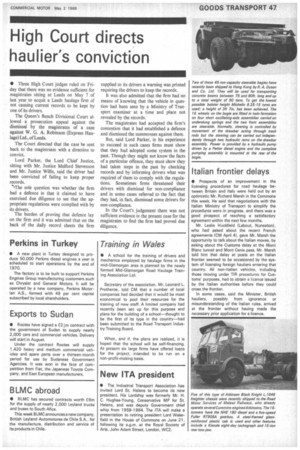High Court directs haulier's conviction
Page 49

If you've noticed an error in this article please click here to report it so we can fix it.
• Three High Court judges ruled on Friday that there was no evidence sufficient for magistrates sitting at Leeds on May 7 of last year to acquit a Leeds haulage firm of not causing current records to be kept by one of its drivers.
The Queen's Bench Divisional Court allowed a prosecution appeal against the dismissal by the magistrates of a case against W. G. A. Robinson (Express Haulage) Ltd., of Leeds.
The Court directed that the case be sent back to the magistrates with a direction to convict.
Lord Parker, the Lord Chief Justice, sitting with Mr. Justice Melford Stevenson and Mr. Justice Willis, said the driver had been convicted of failing to keep proper records.
The sole question was whether the firm had a defence in that it claimed to have exercised due diligence to see that the appropriate regulations were complied with by its drivers.
The burden of proving that defence lay on the firm and it was admitted that on the back of the daily record sheets the firm supplied to its drivers a warning was printed requiring the drivers to keep the records.
It was also admitted that the firm had no means of knowing that the vehicle in ques
tion had been seen by a Ministry of Transport examiner at a time and place not revealed by the records.
The magistrates had accepted the firm's contention that it had established a defence and dismissed the summonses against them.
But, said Lord Parker, in his experience to succeed in such cases firms must show that they had adopted some system in the past. Though they might not know the facts of a particular offence, they must show they had taken steps in the past by checking records and by informing drivers what was required of them to comply with the regula tions. Sometimes firms threatened their drivers with dismissal for non-compliance and in some cases referred to the fact that they had, in fact, dismissed some drivers for non-compliance.
In the Court's judgement there was not sufficient evidence in the present case for the magistrates to find the firm had proved due diligence.




















































































































































































































